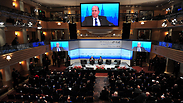
Munich conference: All talk, no action
Analysis: Half empty auditorium at annual security conference indicates Syria crisis is not about to be solved soon, as no one really has the energy to deal with it anymore
And here we essentially have the allegory for the entire event: Last year the same session was held with the same people (more or less) and at the same time – and many remained outside the auditorium because there were too many participants. The West still had fire in its belly over the Syrian issue and the mediator on behalf of the UN, Lakhdar Brahimi, was full of energy and optimism. But this time, the international community simply couldn’t care less. The Syrian massacre is no longer really interesting.
The look on Brahimi's face in front of the half empty auditorium said it all: He appeared weak, exhausted, and most of all – hopeless. He had just arrived from the summit meeting in Switzerland, which attempted to unite all the elements involved in the Syrian crisis, and was forced to admit that the conference did not really achieve anything: The Americans gave excuses, the Syrian opposition heads continued to wipe the tears, and the Russians made it clear to everyone that they would continue supporting Assad.
The general message was clear: This crisis is not about to be solved soon. And the reason is that no one really has the energy to deal with it anymore.
The Munich Security Conference, the most important forum in the world dealing with foreign relations and national security issues, is celebrating its 50th anniversary this week. There is no doubt that the atmosphere is festive and joyful. But if a bit of the festivity covering is rubbed off, very little progress is revealed on the really urgent issues: Syria is one matter, the Russian-sponsored oppression of masses in Ukraine is another. And Snowden's revelations about the United States' collection of information are mentioned only sometimes, in a slight hint, like a wound which must not even be approached.
Defense Minister Moshe (Bogie) Ya'alon arrived in Munich after visiting Berlin. In a series of closed briefings he gave members of the government and media there, he surprised his listeners very much and continued slamming the US harshly. Some of those present were under the impression that Ya'alon was quite satisfied with the commotion created by his remarks as they were published in Yedioth Ahronoth, and that he didn't seem to regret it.
"Just like the Americans don't understand how offended the Germans really were by their spying on German officials, Ya'alon doesn’t understand the meaning of American rage bearing a grudge," I was told by a German government official who met the defense minister.
In order to stress that he had not forgotten what Ya'alon said, US Secretary of State Kerry took the trouble to mention them, saying that the Americans were not messianic or obsessive as they were called, but "we are just working hard."
Two intriguing addresses will conclude the conference on Sunday – Iranian Foreign Minister Mohammad Javad Zarif's and Israeli Defense Minister Ya'alon's. Perhaps these two will surprise and end the conference with a surprising peace offer to each other.










